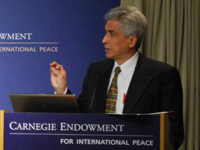Registration
Thank you!
You will receive an email confirming your registration.
IMGXYZ1440IMGZYX Kenya is poised to see gains in agricultural products and processed food but losses in the manufacturing and mining sectors from the Doha Round, the current trade negotiation round of the WTO. This is the main conclusion from a new Carnegie report that examines different trade scenarios to conclude that trade liberalization resulting from the Doha Round, if completed by 2010, would boost Kenya’s annual GDP by 0.2 percent. The incidence of poverty would decline and income distribution would improve in rural areas. Income distribution, however, would worsen in urban settings and the urban/rural income divide would deepen.
Carnegie’s Eduardo Zepeda, a leading author of the report, discussed his findings with Diana Alarcon, senior adviser and cluster leader for Inclusive Development and Poverty Reduction at Bureau for Development Policy at UNDP and James Kiiru, Commercial Attaché at the Embassy of Kenya in Washington. The event was moderated by Carnegie’s Uri Dadush.
Small but Significant Gains
In comparison to a scenario without Doha the following changes would be seen in the Kenyan economy:
- Average annual total production will rise by 2.7 percent.
- Production in processed food and agriculture sector will rise by 2.7 percent and 0.7 percent respectively.
- Production in the manufacturing and mining activities will decrease by 2.1 percent
- Production in service sector will increase by 0.2 percent.
- On average, exports and imports will increase by 3.7 percent and 2.6 percent respectively.
- Consumption will increase by 2.3 percent and investment by 1.4 percent respectively.
- The terms of trade will change by 2.5 percent.
- Overall, the liberalization of trade in goods will boost Kenya’s annual GDP by 0.2 percent.
“Despite marginal increase in agriculture, processed food, and GDP, it is essential to secure commitments outlined in the Doha Round because the gains for Kenya would primarily come from the elimination of subsidies to exports of agricultural goods in the EU and the United States that would make their products more competitive; to a lower extent, gains would also come from reductions in domestic support for agriculture in the developed world, and a general reduction in tariffs around the world,” argued Zepeda.
Impact on Human Development
The Doha-induced trade liberalization will:
- Increase the demand for low skilled workers in both rural and urban areas.
- Reduce the incidence of poverty.
- Improve income distribution in rural areas but worsen income distribution in urban areas.
- Widen the urban/rural income divide.
- Increase employment of semi-skilled and unskilled laborers by 0.02 percent and 0.01 percent respectively.
- Decrease employment for skilled labor by 0.01 percent.
- Decrease wages per worker due to a general drop in the price of goods after liberalization.
Adjustment Costs
“The degree of adjustment costs suggest that trade liberalization under the Doha Round should be complemented by strong, adequately funded, and well-targeted social security policies,” said Zepeda. Adjustment costs are the costs associated with the relocation of resources due to liberalization. Alarcon argued that the positive impact on unskilled and semi-skilled employment comes with a cost, as some workers in the manufacturing and mining activities will be displaced from their work due to factor mobility, which refers to the movement of factors of production, primarily labor and capital, arising from the Doha-induced liberalization. Zepeda recommended designing policies to train new laborers entering the market and retrain the ones that are shifted or reallocated when firms close down due to Doha. There is also a need for a strong social welfare strategy, as outside factors like climate change could significantly raise adjustment costs.
Regional Integration, Doha and Kenya
The positive impact of Doha on agriculture and processed food activities and negative impact on manufacturing and mining for Kenya highlights the need for the Sub-Saharan African nations to negotiate in a bloc. The Doha Round will reinforce Kenya’s trade with developed countries but weaken it with neighboring countries because most of the gains come from tariff and subsidy reductions in the developed world “Kenya should seek to strengthen its leadership in the Doha negotiation and reinforce regional integration,” opined Zepeda. Furthermore, increasing regional integration would help Kenya weather the effects of global economic shocks.
Kirru argued that regional integration is an important issue because the regional market for Kenya is bigger than the whole EU market, one of the most important export destinations for Kenya. Alarcon said that the issue of developing regional markets vis-à-vis global market under the Doha Round should be fully explored.
The Way Forward
Although the Doha Round scenario will likely lead Kenya to specialize in agriculture and processed food, the country should not rest on the back of these two sectors for long-term economic development: “Building comparative advantages in activities with the potential for higher value-addition is vital for achieving higher standards of living,” said Zepeda. Dadush agreed, pointing out that in terms of real gains, what really matters is the kind of policies Kenyans adopt. “The capacity of firms to participate in the international market and governance matter more than high/low tariffs in some selected sectors,” argued Dadush.
Within the existing Doha negotiations, Kenyan policymakers should seek to design sector-specific industrial policies so they can preserve and increase manufacturing capacities, said Zepeda. Apart from assessing the impact of the Doha, it would also be helpful to study the impact of domestic support policies on production and consumption, argued Kirru.
